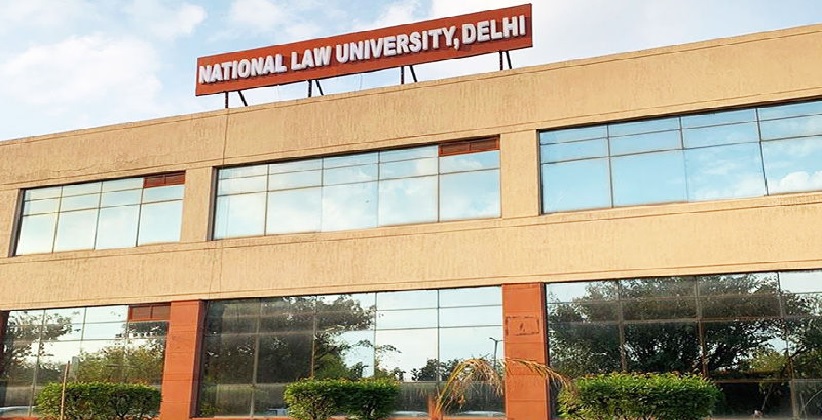The Delhi High Court observed prima facie that the decision of the National Law University-Delhi to implement a 50 percent horizontal reservation from the academic year 2020-2021 for students who passed the qualifying examination from recognized institutes in the National Capital Territory was taken "in haste without acting in accordance with the NLU Act.
The Court acknowledged that the vice-chancellor had no right to "unilaterally" take such a decision, standing side by side with the Governing Council, before which the matter was pending.
On 13th July 2019, the University's Governing Council - comprising Delhi's Chief Secretary, NCT, Chief Secretary (Finance), Secretary (Higher Education), and Chief Secretary (Law, Justice and Legislative Affairs) - raised the question of horizontal quotas. The Council formed a committee comprising Justice N V Ramana, Supreme Court judge, Chief Secretary, NCT Delhi, and Secretary, Higher Education, Government of Delhi, and the Registrar, NLU, Delhi to examine the matter.
The decision to introduce horizontal reservation was taken by the Vice-Chancellor on 14th January 2020, without waiting for the Committee's final decision.
That, the Court said, was obviously under pressure from the Delhi National Capital Territory (GNCTD) government.
The bench comprising Justices Subramonium Prasad and Hima Kohli noted that the State had been exerting pressure on NLU Delhi to make reservations for Delhi students to the extent of 85 percent on the premise that the same was being done in all Delhi State Universities.
The Court made this observation from the record of discussions held on 23 December 2019 between the Vice-Chancellor, NLU Delhi and Secretary GNCTD, Delhi, and the letter dated 6th March 2019, sent by the Higher Education Directorate to Vice-Chancellor NLU Delhi.
"Even the 50% horizontal reservation made by the respondent No.3/NLU, Delhi has not gone down well with the respondent No.1/GNCTD, who is insisting on 85% reservation for students of Delhi", the Court noted.
The Court also noted that GNCTD, which provides funding for NLU D, had ignored the University's repeated demands for more funds to raise seats and facilities to enforce reservation for OBCs and other poorer sections of society.
To 'buy peace' with the GNCTD, the NLUD succumbed to its pressure.
"It appears that the respondent No.3/NLU, Delhi succumbed to the pressure that was being constantly exerted by the respondent No.1/GNCTD only to buy peace and without awaiting the recommendations of the Committee", the Court said.
The Court added:
"Once the Governing Council had decided to constitute a Committee to look into the procedure that may be followed on the issue of providing reservation for candidates clearing the qualifying examination from institutes situated in Delhi, there was no occasion to sidestep the Committee and the Vice-Chancellor could not have decided the issue without approaching the Governing Council for appropriate sanctions constituted by the Governing Council.
When the Governing Council is the Supreme Body and the Statute vests powers on it to take all policy decisions relating to the University, it is incomprehensible as to how the Council could be side-stepped and the impugned Admission Notification dated 14.01.2020 and the Admission Guidelines be issued providing for horizontal reservation".
The bench said that "there was no tearing hurry" for the University to proceed with a horizontal reservation for the present academic year.
The Court further stated that if the notification was not stayed serious prejudice will be caused. It noticed that applications for the current year had dwindled from the previous year's 24,000 to 18,000.
"This significant reduction in the number of applications received by the respondent No.3/NLU, Delhi, is a telling comment on the change made in the admission policy for the academic year 2020-21", it said.
Observing that the petitioners have made out a "prima facie" case, the Court stayed the notification and ordered that "Status quo ante as of the previous academic year shall be maintained for making admissions to the BA LL.B (Five Year Programme) and LL.M (One Year Programme) in NLU, Delhi, for the academic year 2020-21".
The Court explained that its findings are of prima facie view and that after a thorough hearing, the facts of the matter will be determined.
The order was passed by Balwinder Sangwan and Pia Singh, who challenged the University's decision in the writ petitions submitted.
Senior Advocate Neeraj Kishan Kaul with Mr. Nipun Saxena and Mr. Akash Lamba, Advocates and Mr. Nishant Khatri, Advocate appeared for the petitioners.
Advocate Sanjay Vashishta appeared for the University and Standing Counsel (Civil) Ramesh Singh appeared for the GNCTD.






